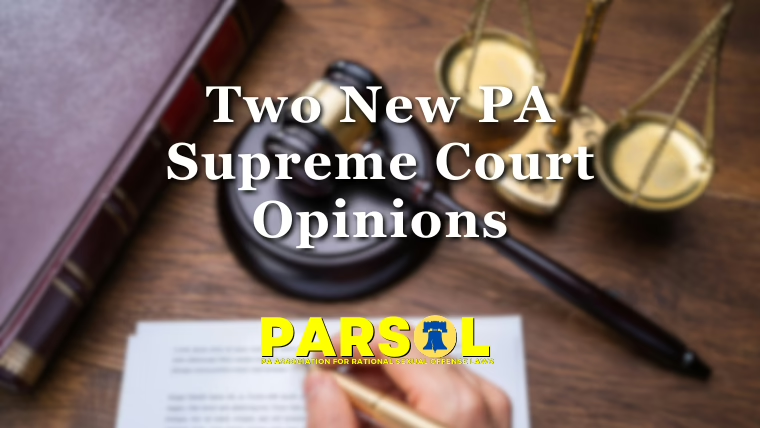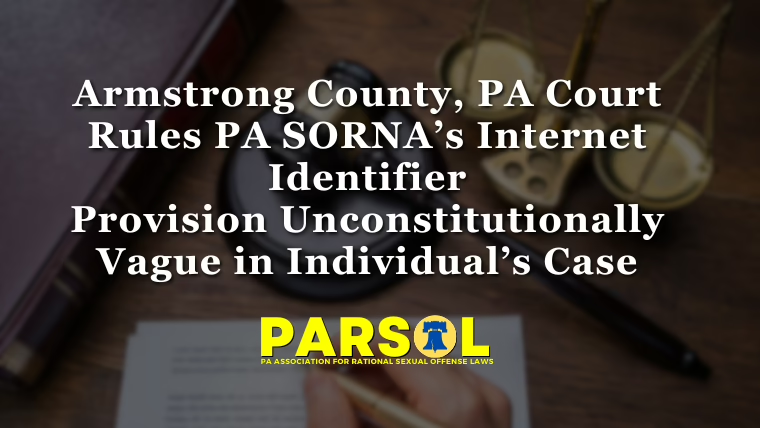On Nov. 20, 2019 the Pa. Supreme Court heard four arguments regarding registration requirements: In Re: H.R., a minor, Com. v. Torsilieri, Com. v. Lacombe, and Com. v. Witmayer. The outcome of these cases will impact all registrants in Pa. if the Court rules that Pa. DHS Act 21 and Acts 10 and 29 of 2018 are punitive and unconstitutional. Should this be the case, we can rest assured that the General Assembly will immediately begin to develop a 3rd version of SORNA, a “legislative fix,” if you will.
Here are some highlights from the cases heard on Nov. 20th:
In Re: H.R., a minor
The issue before the Justices was, “[i]s Act 21 punitive, such that its retroactive application to [Petitioner] and its mechanism for determining whether an individual is a sexually violent delinquent child are unconstitutional under Commonwealth v. Muniz, 164 A.[3]d 1189 (Pa. 2017) and Commonwealth v. Butler, 173 A.3d 1212 (Pa. Super. 2017)?”
Act 21 is a civil commitment statute for individuals who were convicted of a sexual offense as a minor and have aged out of the juvenile justice system. It copies the same mechanism as SORNA’s procedure to determine whether or not someone is a Sexually Violent Predator (SVP) or in the case of a minor, who has been convicted of a sexual offense, is a Sexually Violent Delinquent Child (SVDC). Before the individual becomes 21 and is determined by the Sex Offender Assessment Board (SOAB) to be a SVDC, the individual is sent to a state hospital for involuntary in-patient treatment. After being released from the state hospital, the individual is then required to attend 1 year of out-patient therapy. Failure to comply with the out-patient requirement is a misdemeanor 1 offense under Pa.’s Title 42 Chapter 97 Subchapter H § 9799.36.(c) of SORNA.
The Commonwealth argued that Act 21 was not punitive because in-patient therapy is not as restrictive as a prison and out-patient therapy is a procedure to re-integrate the young adult back into society. Justice Baer pointed out that severing the out-patient procedure from Act 21 makes it impossible for the adult to be released from in-patient therapy, leaving no mechanism to transition back into the community.
The Appellant argued that the component of ACT 21 that indicates failure to comply is a misdemeanor 1 offense makes Act 21 punitive. Remember that the out-patient therapy is also involuntary. The individual would have to follow all the therapy rules which include but are not limited to, little to no internet use, polygraphs, and no alcohol use. The rules are at the discretion of the group facilitator. Failure to comply with the rules would result in being terminated from the treatment group, triggering a misdemeanor 1 offense. Specifically, Subchapter H § 9799.36.(c) says that the individual would be “subject to prosecution under 18 Pa.C.S. § 4915.1 (relating to failure to comply with registration requirements)”, or 18 Pa.C.S. § 4915.1.(c.3).
As mentioned before, Act 21 uses the same mechanism to determine SVDC as SORNA. In Superior Court SORNA’s mechanism was ruled unconstitutional in Butler and has since been argued before the Supreme Court and awaiting a decision. The Superior Court said it was
unconstitutional because the mechanism for determining SVP status lacked a fact finder in the final determination. PARSOL’s belief is that if Butler is upheld in the Supreme Court then Act 21 will also be ruled punitive and unconstitutional since the mechanisms for SVP and SVDC determinations are one and the same.
Commonwealth v. George J. Torsilieri
The main issue in this case was the Chester Counties trial court acceptance of Torsilieri’s expert’s testimony to rebut the Legislative findings. The Commonwealth kept saying that the Legislative findings “overwhelmingly” indicate that those who have been convicted of sexual offenses “pose a high risk of committing additional sexual offenses and protection of the public from this type of offender is a paramount governmental interest” (Title 42, Chapter 97, Subchapter H § 9799.11.(a)(4)). Justice Donohue was troubled that the wording is overly broad as not all of the crimes covered under SORNA are sexual crimes [e.g. 18 Pa.C.S. § 2901 (relating to kidnapping) where the victim is a minor; 18 Pa.C.S. § 2910 (relating to luring a child into a motor vehicle or structure); and 18 Pa.C.S. § 2904 (relating to interference with custody of children), except in cases where the defendant is the child’s parent, guardian or other lawful custodian]. In regard to accepting expert testimony, the Legislature created the SOAB, which is composed of experts in the field of sexual offenses and offenders, to assess if an offender is an SVP. See the contradiction in the D.A.’s argument?
The D.A. argued that Subchapter I was non-punitive because the Legislature lessened the number of times a registrant had to register in-person. Justice Wecht questioned, is it the number of times that a person has to register in-person that triggers whether or not a statute is punitive (quantitative) or is it the inconvenience on the registrant in what contents to register, the short time in which it has to be registered, and who sees what is registered online (qualitative).
Aaron Marcus and Marni Jo Snyder argued on behalf of Mr. Torsilieri. They argued that SORNA is still intrusive and punitive and it’s in violation of Pa.’s Constitution Art.1, Sec. 1 Right to Reputation. Acts 10 and 29 is the modern-day equivalent of the scarlet letter, severely impairing one’s ability to repair his or her reputation.
Com. v. Lacombe and Com. v. Witmayer
This was a consolidated case that shared the same first argument and similar second argument:
- a) Did the lower court err when it concluded that Act 29, Subchapter I, is punitive and unconstitutional, where the statute is intended to protect the community from recidivist sexual predators and is not punitive in effect?
- b) (Lacombe) When the lower court incorrectly concluded that Subchapter I is punitive, should it have treated Lacombe ‘s Amended Petition to Terminate Sex Offender Registration Requirements as an untimely PCRA petition, where his claim raised issues cognizable under the PCRA, it was filed nearly two decades after his judgment of sentence was final, and there were no exceptions to the time bar?
- b) (Witmayer) Did the lower court incorrectly find that Subchapter I is unconstitutional as applied to Witmayer and also unconstitutional on its face?
Just as in Torsilieri, the D.A from Montgomery County, Tracy Piatkowski, argued that SORNA was, in her words, a “civil remedial scheme”. Justice Wecht asked, “how does it differ from
Muniz?” She brought up that Subchapter I was neither overly inclusive nor excessive. She mentioned that 18 Pa.C.S. § 2904 (relating to interference with custody of children) was amended to include “except in cases where the defendant is the child’s parent, guardian or other lawful custodian” and the crimes covered under Subchapter I was reduced from 40 to 17. Justice Donohue rebutted by saying that it still covers aunts, uncles, grandparents, and other relatives. Ms. Piatkowski also pointed out that the Pa. State Police (PSP) added telephone reporting and mailing reporting as other reporting methods to ease the burden on the registrants. But it was brought up by Justice Baer that if a registrant decides to move and register the new address via snail mail, he/she only has three days to do so. What if the mail takes longer than three days to get to the PSP? Will the registrant be considered noncompliant?
What’s the Deal?
The Legislature wants to keep the ability to sentence individuals to incarceration or probation with the registry as a civil collateral consequence. This is not constitutionally possible under any circumstances. SORNA is so messed up that no one, not even the law enforcement officers, can make heads or tails of it. PARSOL promotes “rational” sexual offense laws and encourages law makers to shift from what have historically been rushed “legislative fix’s” that have resulted in constitutional violations and have been ineffective in reducing sexual victimization. PARSOL has been meeting with members of the Pa. House and Senate Judiciary Committees to promote this shift to laws based on empirical evidence and the U.S. and Pennsylvania Constitutions. Many of our law makers have been open to this dialogue. Nonetheless, change takes time and we need to continue our work toward improving knowledge and attitudes related to RATIONAL sex offense laws among the public, media, and legislators so that the realization of effective and constitutional legislation happens sooner rather than later.




